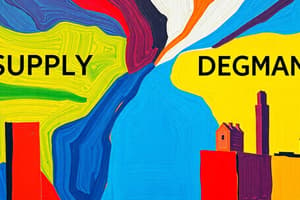Podcast
Questions and Answers
Which concept is central to the study of economics?
Which concept is central to the study of economics?
- The organization of political systems.
- The study of production, distribution, and consumption of goods and services. (correct)
- The unlimited nature of resources to satisfy human wants.
- The distribution of wealth in a utopian society.
How does a country's economic system primarily function?
How does a country's economic system primarily function?
- By maximizing its population growth.
- By organizing its economy. (correct)
- By controlling its military strength.
- By regulating international trade agreements.
In a planned economy, which entity primarily makes economic decisions?
In a planned economy, which entity primarily makes economic decisions?
- Private corporations.
- Market forces.
- Individual consumers.
- The central government. (correct)
Which characteristic defines a market economy?
Which characteristic defines a market economy?
What is the key feature of a mixed economy?
What is the key feature of a mixed economy?
Why does scarcity necessitate economic systems?
Why does scarcity necessitate economic systems?
How does 'labor' contribute as a resource within economic activities?
How does 'labor' contribute as a resource within economic activities?
Which best defines capital as a resource category?
Which best defines capital as a resource category?
What are the three core decisions that economics helps a society make?
What are the three core decisions that economics helps a society make?
In a market economy, what does 'exchange' primarily relate to?
In a market economy, what does 'exchange' primarily relate to?
How do consumers primarily influence a market economy?
How do consumers primarily influence a market economy?
What is achieved at the equilibrium point in a market?
What is achieved at the equilibrium point in a market?
What typically happens to demand if the price of a product increases?
What typically happens to demand if the price of a product increases?
When demand increases, what immediate effect does this have on the supply of a product?
When demand increases, what immediate effect does this have on the supply of a product?
How do producers typically respond when the supply of their product increases significantly?
How do producers typically respond when the supply of their product increases significantly?
What happens to prices when demand increases but supply remains constant?
What happens to prices when demand increases but supply remains constant?
What condition is achieved when the market finds a balance with a fair price for both producers and consumers?
What condition is achieved when the market finds a balance with a fair price for both producers and consumers?
Which of the following is an example of competition between producers?
Which of the following is an example of competition between producers?
How do warranties primarily impact competition among producers?
How do warranties primarily impact competition among producers?
Which factor is primarily at play when a producer is unable to compete effectively in a market economy?
Which factor is primarily at play when a producer is unable to compete effectively in a market economy?
What is a monopoly in the context of market economies?
What is a monopoly in the context of market economies?
Why is a monopoly generally considered unfavorable for consumers?
Why is a monopoly generally considered unfavorable for consumers?
What best describes an oligopoly?
What best describes an oligopoly?
In which type of economy does the government typically become involved?
In which type of economy does the government typically become involved?
What is a crown corporation?
What is a crown corporation?
What is the main purpose of CANCON rules in the arts?
What is the main purpose of CANCON rules in the arts?
How does Telefilm Canada support Canadian filmmakers?
How does Telefilm Canada support Canadian filmmakers?
Why might a government provide operating grants to businesses?
Why might a government provide operating grants to businesses?
What is the purpose of tax breaks as a form of government involvement in the economy?
What is the purpose of tax breaks as a form of government involvement in the economy?
How does the government use recycling taxes to influence business and consumer behavior?
How does the government use recycling taxes to influence business and consumer behavior?
What is the primary reason governments enforce labeling regulations?
What is the primary reason governments enforce labeling regulations?
How does preventing price fixing benefit consumers?
How does preventing price fixing benefit consumers?
Which of the following is a potential negative impact of government involvement in the economy?
Which of the following is a potential negative impact of government involvement in the economy?
How does labor force contribute to the economy?
How does labor force contribute to the economy?
What primarily leads to a 'recession' in an economy?
What primarily leads to a 'recession' in an economy?
What is the main goal of workers organizing into a union?
What is the main goal of workers organizing into a union?
To what side of the economic spectrum would unions be associated?
To what side of the economic spectrum would unions be associated?
What is another name for planned economy?
What is another name for planned economy?
What is the primary action workers take when they go on strike?
What is the primary action workers take when they go on strike?
Besides better wages, what other reasons might motivate workers to strike?
Besides better wages, what other reasons might motivate workers to strike?
Flashcards
What is economics?
What is economics?
The study of the production, distribution, and consumption of goods and services.
What is an economic system?
What is an economic system?
How a country organizes its economy.
What is a planned economy?
What is a planned economy?
An economic system where all economic decisions are made by the government.
What is a market economy?
What is a market economy?
Signup and view all the flashcards
What is a mixed economy?
What is a mixed economy?
Signup and view all the flashcards
What is scarcity?
What is scarcity?
Signup and view all the flashcards
What is Land?
What is Land?
Signup and view all the flashcards
What is Labour?
What is Labour?
Signup and view all the flashcards
What is Capital?
What is Capital?
Signup and view all the flashcards
What is supply and demand?
What is supply and demand?
Signup and view all the flashcards
Who are consumers?
Who are consumers?
Signup and view all the flashcards
Who are producers?
Who are producers?
Signup and view all the flashcards
What is equilibrium?
What is equilibrium?
Signup and view all the flashcards
What is Competition?
What is Competition?
Signup and view all the flashcards
What is a monopoly?
What is a monopoly?
Signup and view all the flashcards
What is an oligopoly?
What is an oligopoly?
Signup and view all the flashcards
What is a union?
What is a union?
Signup and view all the flashcards
What is collective bargaining?
What is collective bargaining?
Signup and view all the flashcards
What is a strike?
What is a strike?
Signup and view all the flashcards
What is the labour force?
What is the labour force?
Signup and view all the flashcards
What is the unemployment rate?
What is the unemployment rate?
Signup and view all the flashcards
Study Notes
- Economics looks at the production, distribution, and consumption of goods and services.
- An economic system shows how a country organizes its economy.
Three Categories of Economic Systems
-
Planned economy: government makes all economic decisions
-
Market economy: individuals make all economic decisions in the marketplace
-
Mixed economy: a combination of individual and government economic decisions
-
Scarcity exists because limited resources are available to satisfy humans' unlimited wants.
Resource Categories
-
Land: natural resources
-
Labor: human effort to complete work
-
Capital: investment to build production capacity and the tools or machines to do work
-
Economics helps decide what to produce, how to produce it, and who gets what is produced
Market Economic Principles
- Supply and demand relate to products and money exchange rules in a market economy.
- Consumers are individuals or businesses that purchase goods and services and generate demand for products.
- Producers are individuals/businesses creating goods and services and generate the supply of products.
- Equilibrium is when the market is balanced.
- Supply equals demand at a fair price for producers and consumers during equilibrium.
Changes to Equilibrium
- When the price of products increases, demand decreases, and supply increases.
- Higher prices lead producers to lower prices, resulting in increased demand and decreased product supply.
- Producers then raise their prices again when supply decreases.
- Cycles continue until a new equilibrium is found.
- A new equilibrium is when supply equals demand, and producers and consumers have a fair price.
Competition
- Competition exists between producers for consumers’ money and between consumers for producers’ products.
- Factors impacting competition: price, quality, warranties, good service, comfortable environment, product selection, brand equity, and reward programs.
- Hyundai and BMW are competitors.
- Hyundai has competitive advantages: lower price, inexpensive servicing, readily available products, hybrid/electric vehicles for a reasonable price, and good styling.
- BMW has competitive advantages: prestigious brand, high-quality vehicle components, long-lasting vehicles, more features, faster vehicles, premier styling, and gas/electric options.
- A producer or store goes out of business if they cannot compete and cannot make a profit in a market economy.
Market Economy Terms
- Monopoly: one producer controls almost all of the market for a product
- Consumers are negatively impacted by monopolies due to the lack of competition, which leads to higher prices.
- Oligopoly: a few producers control almost all of the market for a product
- An example of an oligopoly is Canadian phone companies, which causes upward pressure on prices that consumers pay.
Government Involvement
- Canada has a mixed economy.
- One example of government involvement is a crown corporation.
Other Examples of Government Involvement
- The Arts: government funding to artists, CANCON rules, and Telefilm Canada also support Canadian filmmakers
- Supporting Other Businesses: operating grants, tax breaks, and loans
- Environmental Initiatives: recycling and carbon taxes
- Labeling Regulations: ingredient lists and nutrition information
- Preventing Price Fixing
- Providing Services for the Public Good - social programs
Positives of Government Involvement
- Limit monopoly power
- Keep businesses open in Canada
- Allow artists to produce art
- Promote Canadian culture
- Keep Canadians safe
- Reduce waste and pollution
- Protect nature
Negatives of Government Involvement
- Higher taxes
- Red tape
- Extra expenses for businesses
- Promotes people that don’t actually like the business
- Reduces efficiency
Labour Force and Unemployment
- Labour Force: total number of people in an economy who can work
- Unemployment Rate: percentage of the labour force that does not currently have a job
- The unemployed want a job, but mostly because of economic factors and recession.
Unions and Economics
-
Union: workers organized to negotiate as a group with their employer
-
Unions are on the left side of the economic spectrum.
-
Collective bargaining: negotiating together as a group
-
Another name for a planned economy is collectivism
-
Strike: stopping work as a whole union
-
Reasons to strike: better wages, better working conditions, benefits, less hours of work
-
Strikes pressure the employer to give concessions to workers.
Positives of Unions
- Protect workers’ rights and jobs
- Higher wages/more benefits
- Fewer work hours
- Holiday pay and paid vacation
Negatives of Unions
- Costs money to be a part of a unions (union dues)
- Have to go along with the majority for job action
- Too high of wages can put pressure on businesses
Union connection to the Charter
- Section 2: Freedom of Association
- Guarantees the right to collective bargaining
Studying That Suits You
Use AI to generate personalized quizzes and flashcards to suit your learning preferences.




